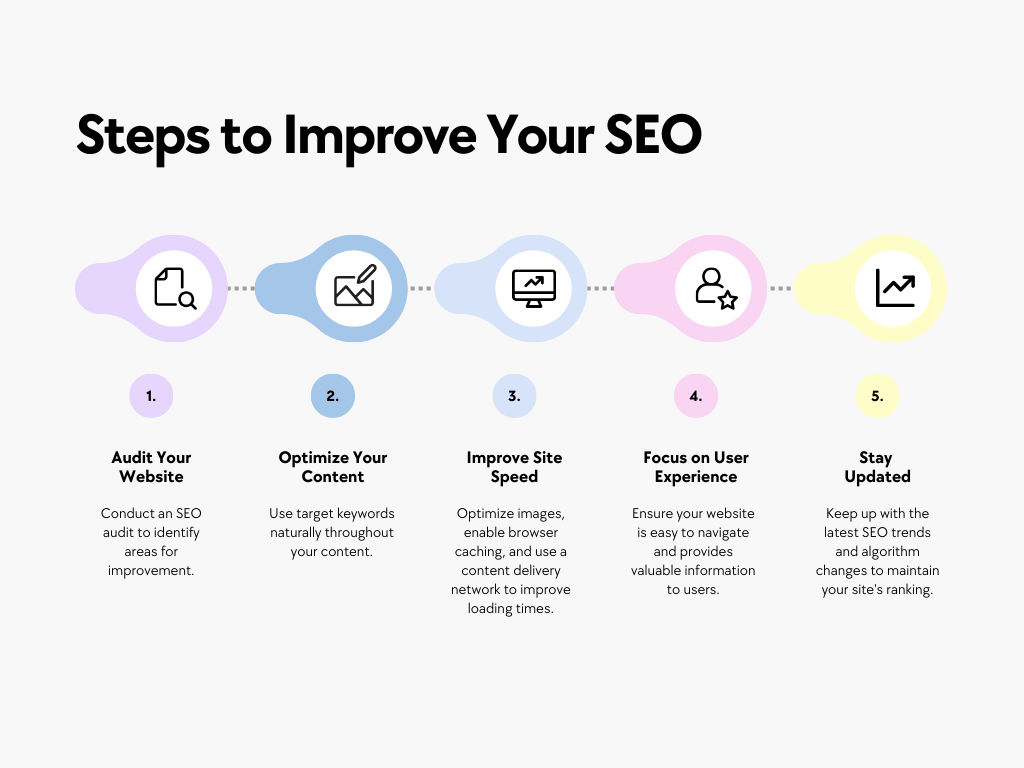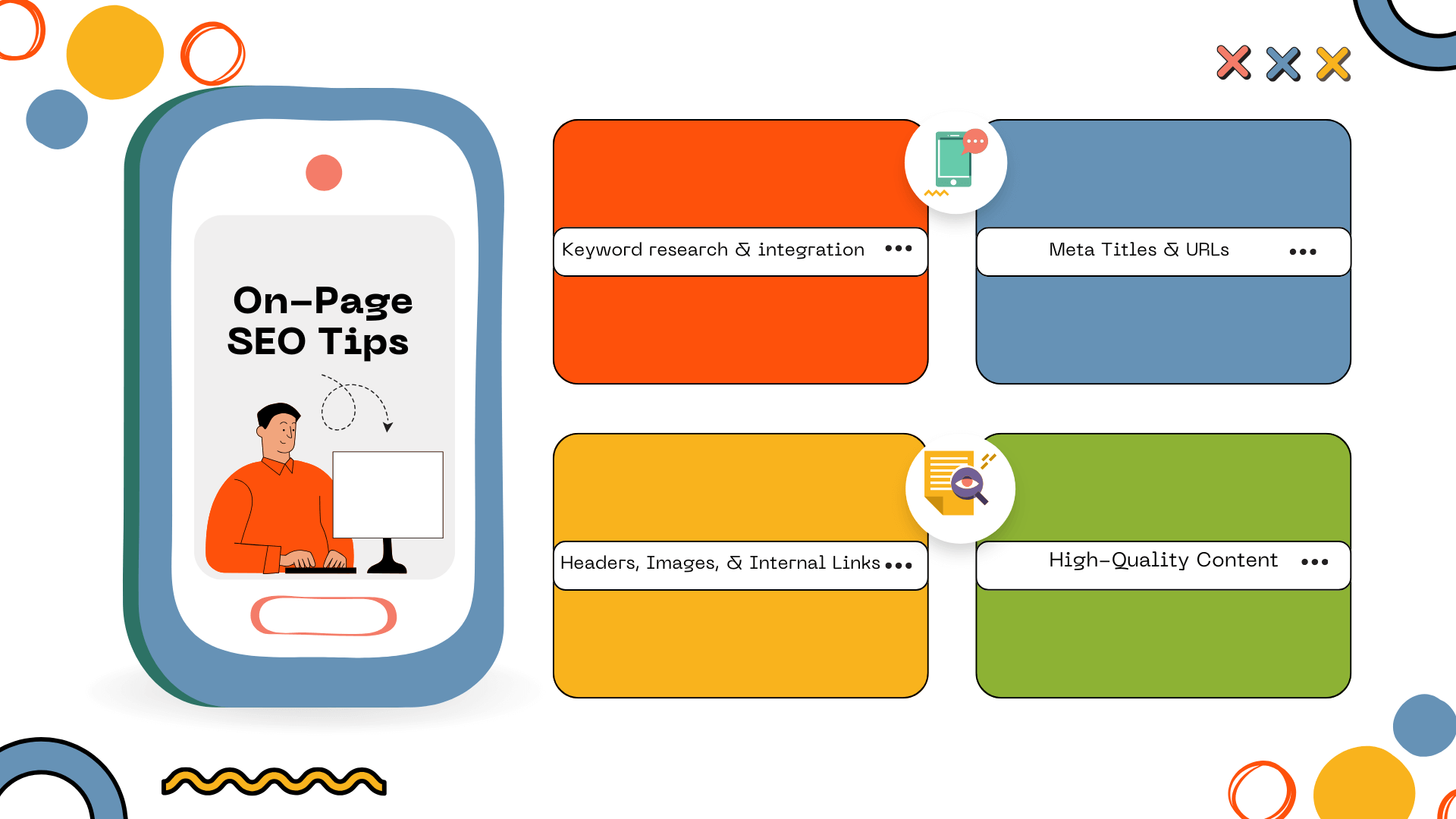Yes! I'd like to be contacted to schedule a consultation!
You’re licensed to provide mechanical contracting services, have mastered your craft, and have been in business for a while, delivering excellent customer care and code-compliant solutions for local homeowners and businesses. The clients you work with love your expertise and the quality of the HVAC, plumbing, and electrical installation, repair, and maintenance services you provide, but new clients are still only trickling in.
You know the problem isn’t with your speedy service or safe and by-the-book mechanical contracting services, pricing, or technicians, so what’s going on? Often, your web presence and whether you understand and employ the fundamentals of search engine optimization (SEO) are the issues that are causing the barrier between your business and the growth you expect to see.
In this blog, LinkNow Media’s digital marketing specialists explain what SEO is, how all its moving pieces work together to influence your online visibility, how to use it to outrank your competitors, and what to avoid. With an effective SEO strategy in place, you can connect with more potential clients in your area and start receiving more qualified leads, clicks, and calls.

Search engine optimization (SEO) refers to all the things you can do on your website and behind the scenes that help search engines recognize your site as a valuable resource for those needing or asking questions about your services. There are many different pillars to SEO, which we’ll get into in a bit, but they all boil down to the same goal: getting your mechanical contractor site in front of as many potential clients as possible.
Think of SEO as a mechanical contracting system for your website. You want to create a nice, welcoming environment, but there’s a lot of work that goes on in the background to make that happen. In the same way that ducts, wires, and pipes are hidden behind walls (but play a vital role in a building’s operation), SEO’s unseen components—like keyword optimization, meta tags, backlink building, and technical adjustments—help your website attract traffic, rank higher, and perform effectively.
Both processes require expertise, ongoing maintenance, and regular updates to adapt to new technologies or regulation changes—whether it’s a local building code or a Google algorithm update. In essence, SEO is the digital infrastructure of your online presence, ensuring everything works together to attract, engage, and retain your audience.
Are you doing all you can to make sure your website operates at its full potential?
Search Engine Optimization gives mechanical contracting companies a significant competitive advantage by making them more visible to potential clients actively searching for mechanical services online.
In an industry where trust and expertise are paramount, ranking high on search engine results establishes credibility and positions your company as a leader in your field. SEO ensures your business appears when local clients search for terms like "mechanical contractor near me" or "HVAC installation services." This increases your likelihood of attracting new customers.
When you optimize your website for relevant keywords, showcase client testimonials, and create valuable content highlighting your expertise, these SEO initiatives help you stand out from competitors who may not have an effective online presence.
Additionally, a well-optimized website improves user experience, making it easy for readers to find the information they need and contact you quickly. In a crowded market, SEO provides the digital edge you need to grow your business, generate consistent leads, and stay ahead of your competition.
Google ranks your mechanical contracting company’s website by indexing your pages and then using its algorithms to evaluate a combination of attributes to determine how relevant and authoritative your page is for user searches. First, it looks at your content, checking for keywords that match what people are searching for. Examples of these searches could be "plumbing repair near me" or "electrical installation services."
Your content’s quality and depth are also under the microscope. Google assesses these to make sure it provides valuable information to visitors. Outside of your written, visual, and audio content, your website’s technical health plays a significant role—things like mobile-friendliness, fast loading speeds, and secure HTTPS encryption impact your ability to climb the rankings and appear on Google’s coveted first page.
Google looks at a combination of these elements to see if your website demonstrates relevance, reliability, and an excellent user experience. Since competition is fierce for a place on the first page of results, regular updates and consistent optimization are crucial to staying relevant.

We hinted about them above, and now it’s time to discuss the fundamentals of a well-rounded SEO strategy.
Search engine optimization can be broken down into the following parts:
In the following sections, we provide the information you need to know about each (and how to use these pillars) to get on the same page (in search engine results) as your target audience. It’s really the only way they’ll see your content because users have less and less time (and motivation) to wade through a pile of results to find what they need.

On-page SEO involves optimizing your website’s content and structure to make it relevant and valuable to users and search engines.
This includes:
Start by conducting thorough keyword research to identify terms your target audience is searching for, like "HVAC repair near me" or "plumbing installation services." Use the keywords you identify in your page titles, meta descriptions, headers, and content to signal relevance to search engines.
Check your service pages to make sure they’re detailed and user-focused, highlighting the areas you serve, the problems you solve, and the value you provide. Adding visual elements like photos of past projects or diagrams can make your content more engaging, and including them gives you a chance to optimize image alt tags for an improved SEO score.
Don’t forget to interlink your pages strategically. This makes it easy for visitors to navigate between related services and learn more about what you offer. Lastly, focus on crafting clear, compelling calls to action (CTAs) that encourage users to take the next step, like requesting a quote or scheduling a consultation with you.
Use keyword research tools like Google Keyword Planner or Ahrefs to find high-volume, low-competition keywords relevant to your business. Focus on a mix of short-tail keywords (e.g., "mechanical contractor") and long-tail keywords (e.g., "emergency HVAC repair in [City]") to cover broad and specific search intents.
Analyze your competitor’s websites to discover which keywords they rank for and identify gaps you can fill with your content. Prioritize user intent by selecting keywords that align with the questions or problems your target audience is trying to solve, ensuring your content delivers real value.
Finally, incorporate your chosen keywords naturally into your website’s content, meta descriptions, headers, and image alt tags, avoiding keyword stuffing. Follow these best practices to create a targeted SEO strategy that drives traffic and converts your site visitors into clients.
Selecting topics that resonate with people who need mechanical contracting products and services is simple when you understand search intent. Search intent refers to the purpose behind a user’s online search—what they want to accomplish or learn when they type a query into a search engine.
To understand a searcher’s intent, begin by categorizing intent into informational (seeking knowledge), navigational (looking for a specific website), transactional (ready to make a purchase or hire a service), and commercial investigation (researching options before making a decision). For mechanical contractors, this might mean identifying keywords like "how to maintain an HVAC system" for informational content or "best HVAC repair in [your city]" for transactional intent.
Choose content topics that address your audience’s pain points, questions, and goals. For example, write blogs about common HVAC problems or guides on choosing the right mechanical contractor. Use tools like Google’s autocomplete or related searches to uncover other related topics.
Align your content with the appropriate search intent by providing clear, valuable information or actionable solutions. This will ensure your website meets user needs and establishes your authority in the field.
A title tag is like the headline of your web page, showing up as a clickable link in search engine results. It’s a small but mighty tool for helping search engines and visitors understand what your page is all about. To make your title tags work for you, keep them short—ideally under 60 characters—and include keywords that matter to your audience.
Give each page a unique, descriptive, engaging title that stands out in search results. Well-crafted title tags are key to your mechanical contracting website’s success in drawing in potential clients, showcasing expertise, and improving your chances of being found in a competitive market.
A meta description should be between 150 and 160 characters long, providing enough detail to inform and attract readers without getting cut off in search results. It should include relevant keywords, a clear summary of your page’s content, and a compelling call to action to encourage clicks.
While your meta descriptions don’t directly impact rankings, they influence click-through rates by giving users a snapshot of what they’ll find on your page. A well-written meta description is your first impression in search results, making it an essential part of your SEO strategy.
How you structure your website’s URLs factors into its UX and SEO “score.” A well-structured URL is concise, descriptive, and includes relevant keywords that align with your content. Aim to use URLs that make it clear what your page is about.
For example, here are two possible URLs for a page on HVAC Repair:
The first URL communicates nothing about what the page contains. On the other hand, the second URL is clean and logical, making it easier for search engines to crawl, which boosts your chances of ranking higher. An organized URL structure also supports better navigation, making it easier for users to find and share your pages. When your goal is to drive more traffic and engagement, consider your URLs a simple, user-friendly roadmap to your content.
Off-page SEO is a pillar that focuses on building your website’s reputation and authority through external factors, primarily:
Off-page SEO demonstrates to search engines that your website is trustworthy and credible.
Getting credible backlinks for your mechanical contracting website starts with building trust and providing value through high-quality, informative content. Create resources like blog posts, case studies, or guides that solve common industry problems or showcase your expertise. Reach out to industry-specific directories, trade associations, or local business organizations to get listed on their websites.
Partnering with reputable suppliers or manufacturers and asking for backlinks will strengthen your site’s credibility. Additionally, there’s a lot of value in engaging with your local community by sponsoring events or contributing guest articles to regional publications. Interacting with your target audience in this way makes them want to naturally highlight your community spirit with a backlink, brand mention, like, or share.
These essential off-page SEO components help establish your mechanical contracting company as a trusted, recognized name in your industry. Social signals, like shares, likes, and comments, show search engines that your content is valuable and engaging.
Brand mentions, whether linked or unlinked, build awareness and reinforce your presence in the marketplace. To leverage these effectively, actively engage on social media platforms by sharing industry insights, project highlights, and customer testimonials. Encourage satisfied clients to mention your business in their posts or reviews.
You can also consider partnering with influencers in the construction or contracting space to amplify your reach. Consistent activity and meaningful interaction boost your visibility and position your business as approachable, knowledgeable, and worth trusting.
Absolutely! Positive feedback from satisfied clients is one of the most powerful tools for building trust and credibility. Reviews and testimonials act as social proof, demonstrating that your business is reliable, skilled, and customer-focused. They also showcase your expertise and highlight the unique value your business brings.
Encourage clients to leave reviews on platforms like Google or industry-specific directories, and prominently feature these testimonials on your website and social media. Doing so attracts new clients and strengthens loyalty among existing ones, creating a positive feedback loop that drives trust, engagement, and growth for your business.
Technical SEO covers the backend infrastructure of your website to make sure it’s optimized for search engines to find and crawl with ease. These are also aspects you can tweak to provide a better user experience because no one wants to stay on your site if pages aren’t loading, buttons are jumping around, or your site won’t load properly on a phone or tablet.
Technical SEO includes aspects like:
Without a solid technical foundation, even the best content won’t rank well, so you should monitor these technical aspects closely and fix errors as soon as possible.

User experience refers to the overall experience visitors have when interacting with your website, mainly regarding how easy and enjoyable it is to use. It encompasses everything from ease of navigation to how quickly pages load and how engaging your content is. A positive UX is crucial for a successful mechanical contracting company’s site because it directly impacts how potential clients perceive your business.
Technical SEO is crucial for UX. If your website is slow, difficult to navigate, or lacks the information users seek, they will likely leave and turn to one of your competitors.
Google recognizes the importance of UX and assesses elements that make a site easier to use. Websites that provide a smooth, intuitive experience are rewarded with higher rankings in search results, making it easier for potential clients to find you. Elements like mobile-friendliness, clear calls-to-action, and engaging, informative content contribute to a great user experience.
A strong UX also builds trust and encourages visitors to spend more time exploring your services. This means they’re more likely to contact you for HVAC, plumbing, or electrical work.
Investing in technical SEO and your site’s UX ensures your digital presence works for your clients and aligns with their needs. Prioritizing how users feel when interacting with your website helps turn casual visitors into loyal customers and gives your business a distinct edge in a competitive market.

Use local SEO best practices to make your company visible to customers in your geographic area when they search for services like "HVAC contractor near me" or "plumbing repair in [city]." Mastering local SEO starts with claiming and optimizing your Google Business Profile (GBP) by ensuring your business name, address, phone number (NAP), and hours of operation are accurate and up-to-date.
Collecting positive customer reviews is another way to dominate local search results because they signal trustworthiness and improve your local rankings. Additionally, targeting location-specific keywords on your website and creating localized content—like blog posts or service pages tailored to specific neighborhoods—further boosts your visibility.
Don’t forget to list your business in reputable online directories like Yelp, Angi, and industry-specific platforms. With the right combination of these strategies, you can dominate local search results, connect with nearby customers, and build a strong community presence that keeps your mechanical installation and maintenance business thriving.
Don’t neglect setting up your Google Business Profile (GBP). It’s a straightforward process that significantly improves your business’s local visibility.
Follow these steps to get started:
You can further enhance your profile by adding photos of your business, team, and projects to make your profile more engaging. Then, you can write a compelling business description highlighting your services, specialties, and what sets your mechanical contractor services apart.
With years of experience helping clients implement personalized digital marketing strategies, we’ve seen firsthand how certain SEO mistakes can hold businesses back.
To help you succeed, here are some common SEO pitfalls mechanical contracting businesses should avoid:
A website that’s difficult to navigate, slow to load, or unresponsive on mobile devices will frustrate users and drive them away. Prioritize fast loading times, intuitive navigation, and mobile-friendly designs.
Content that lacks depth, value, or relevance can hurt your credibility and fail to engage your audience. Always aim to create high-quality, actionable content that addresses your audience’s questions and provides meaningful solutions.
Stuffing keywords into your content is unnatural to readers and leads to search engine penalties. Focus on strategically placing relevant keywords so they read naturally.
Broken links signal poor site maintenance and can harm your credibility. To keep your site functional and user-friendly, check your website for broken links often and fix or replace them.
Pop-ups that interrupt the user experience lead to higher bounce rates. Use pop-ups sparingly and make sure they’re easy to close so they offer value rather than annoyance.

As technology evolves, so does the way users search for information online. Staying ahead of these trends is crucial for mechanical contractors aiming to grow their digital presence.
Here’s a glimpse into the future of SEO and how you can adapt to these innovations:
Voice search operates using voice recognition technology and natural language processing to interpret spoken queries and deliver accurate results. Unlike text searches, voice queries are often longer and phrased conversationally, reflecting how people naturally speak.
For example, instead of typing "mechanical contractor near me," users might ask, "Who is the best mechanical contractor near me?"
Don’t miss your opportunity to optimize for voice search and capture a growing audience of mobile and smart device users. To do this, focus on long-tail keywords and conversational phrases that match natural speech patterns. Incorporating question-based content, like FAQs, can directly address common voice queries.
Voice search optimization is another way to enhance your brand’s visibility and position your business to meet the evolving needs of tech-savvy customers.
Image search analyzes images’ metadata, file names, alt text, and surrounding content to determine their relevance to user queries. Search engines like Google use this information to display images in search results, making it an essential tool for businesses looking to stand out visually.
For mechanical contractors, optimizing for image search can be a game-changer in capturing a broader audience. Potential clients often search for project inspiration, equipment types, or service examples, and well-optimized images position your work front and center. Use descriptive file names, keyword-rich alt text, and high-quality visuals to attract more clicks, drive traffic to your website, and shine a spotlight on your expertise in a competitive market.
Zero-click searches occur when users find the information they need directly on the search engine results page (SERP) without clicking a link. This is common with featured snippets, knowledge panels, or local business listings.
Mechanical contractors can benefit by ensuring their business information—contact details, operating hours, and emergency service availability—is accurate and updated across platforms, especially Google Business Profile. Using structured data (schema markup) helps search engines present business information in rich results, giving these HVAC specialists a prominent presence on the SERP even if users don’t visit their site.
Answer Engine Optimization involves creating content tailored to directly address user queries, like “How can I fix a leaky faucet?” or “What are the signs my HVAC system needs repair?” Provide clear, actionable answers to common questions and see how much easier it is to establish authority in your industry and drive traffic through featured snippets and other SERP features.
SEO is no longer just a nice-to-have. It’s critical to growing your HVAC, plumbing, electrical, and really any mechanical contracting business. You need to stay ahead of trends like voice search, image search, and zero-click searches to make sure your website remains visible, relevant, and engaging for potential clients.
LinkNow is here to help you do it, making it simple and helping you save time and money. Invest in the fundamentals of on-page, off-page, technical, and local SEO to strengthen your online presence and drive measurable results. Whether it’s crafting high-quality content, optimizing for mobile, or ensuring your Google Business Profile is in top shape, each effort contributes to a comprehensive strategy that helps you connect with your target audience and grow your business.
Looking for solid digital marketing solutions that translate into real results? Contact LinkNow’s team of SEO specialists at +1 888-667-7186 today.